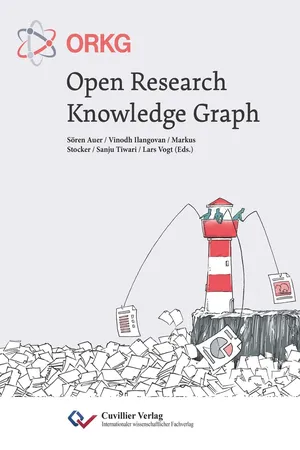About this book
As we mark the fifth anniversary of the alpha release of the Open ResearchKnowledge Graph (ORKG), it is both timely and exhilarating to celebrate the significantstrides made in this pioneering project. We designed this book as a tributeto the evolution and achievements of the ORKG and as a practical guide encapsulatingits essence in a form that resonates with both the general reader and thespecialist.The ORKG has opened a new era in the way scholarly knowledge is curated, managed, and disseminated. By transforming vast arrays of unstructured narrative textinto structured, machine-processable knowledge, the ORKG has emerged as anessential service with sophisticated functionalities. Over the past five years, ourteam has developed the ORKG into a vibrant platform that enhances the accessibilityand visibility of scientific research. This book serves as a non-technical guideand a comprehensive reference for new and existing users that outlines theORKG's approach, technologies, and its role in revolutionizing scholarly communication.By elucidating how the ORKG facilitates the collection, enhancement, andsharing of knowledge, we invite readers to appreciate the value and potential ofthis groundbreaking digital tool presented in a tangible form.Looking ahead, we are thrilled to announce the upcoming unveiling of promisingnew features and tools at the fifth-year celebration of the ORKG's alpha release.These innovations are set to redefine the boundaries of machine assistance enabledby research knowledge graphs. Among these enhancements, you can expectmore intuitive interfaces that simplify the user experience, and enhanced machinelearningmodels that improve the automation and accuracy of data curation.We also included a glossary tailored to clarifying key terms and concepts associatedwith the ORKG to ensure that all readers, regardless of their technical background, can fully engage with and understand the content presented. This booktranscends the boundaries of a typical technical report. We crafted this as an inspirationfor future applications, a testament to the ongoing evolution in scholarlycommunication that invites further collaboration and innovation. Let this book serveas both your guide and invitation to explore the ORKG as it continues to grow andshape the landscape of scientific inquiry and communication.
Tools to learn more effectively

Saving Books

Keyword Search

Annotating Text

Listen to it instead
Information
Table of contents
- Acknowledgements
- Prologue
- 1. Introduction
- 2. ORKG Concepts
- 2.2 Content Types
- 2.3 Miscellaneous Tools
- 3. Guidelines for creating Comparisons
- 3.1 Understanding the value of Comparisons in the ORKG
- 3.2 Important characteristics of a Comparison
- 3.3 Creating high quality Comparisons
- 3.4 Ensuring data quality of Comparisons
- 3.5 Discoverability of ORKG Comparisons
- 3.6 Conclusion
- 4. ORKG Benchmarks
- 4.1 Definitions
- 4.2 Guide to Creating a Benchmark in the ORKG
- 4.3 The Workflow Dynamics of ORKG Benchmarks
- 4.4 Conclusion
- 5. Modeling and Quality Assurance throughTemplates
- 5.1 Need for a template system
- 5.2 Overview
- 5.3 SHACL Shapes
- 5.4 Import/Export Functionality
- 5.5 Future Perspectives
- 5.6 Conclusion
- 6. Natural Language Processing for the ORKG
- 6.1 ORKG Natural Language Processing Facets
- 6.2 Evolution of NLP Services with Large Language Models
- 6.3 LLMs' Comprehensive Capabilities
- 6.4 LLM-based ORKG Smart Suggestions
- 6.5 Scholarly Question Answering with the ORKG
- Linked Data (QALD) Challenge10.6.7 LLMs in Scholarly QA
- 6.8 Conclusion and Outlook
- 7. Energy Systems Analysis as an ORKGUse Case
- 7.1 Motivation
- 7.2 Research Question
- 7.3 Conclusion and Outlook
- 8. Harnessing the potential of the ORKG forsynthesis research in agroecology
- 8.1 Motivation
- 8.2 Research Question
- 8.3 ORKG Comparison
- 8.4 Visualizations
- 8.5 Conclusions
- 9. Knowledge synthesis in Invasion Biology:from a prototype to community-designedtemplates
- 9.1 The prototype with Hi Knowledge data
- 9.2 The ecologist community gets more involvedMotivation
- 9.3 Engaging with the broader community of invasion biologistsMotivation
- 9.4 Further use of ORKG in the context of invasion biologyORKG for teaching in ecology
- 9.5 Conclusion
- 10. Data to Knowledge: Exploring the SemanticIoT with ORKG
- 10.1 Motivation
- 10.2 Background
- 10.3 Semantic IoT in Specific Domains
- 10.4 Major Sources of IoT Ontologies
- 10.5 Conclusion
- 11. Food Information Engineering for a SustainableFuture
- 11.1 Motivation
- 11.2 Food Information Engineering
- 11.3 Food Information Engineering Observatory
- 11.4 Summary and conclusion
- Afterword
- Glossary
